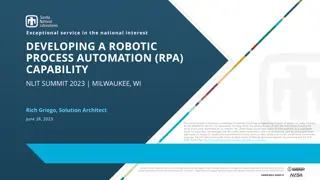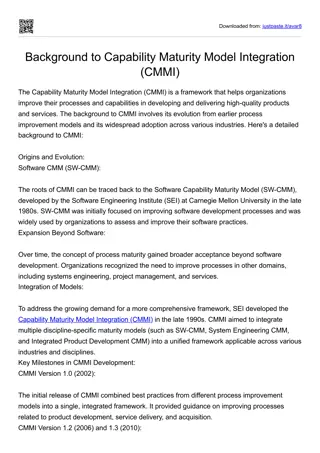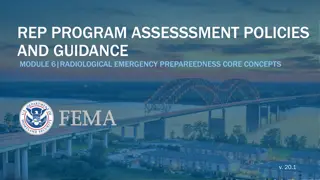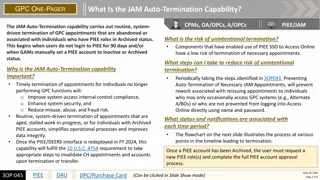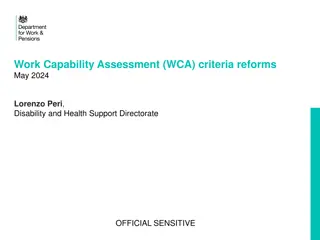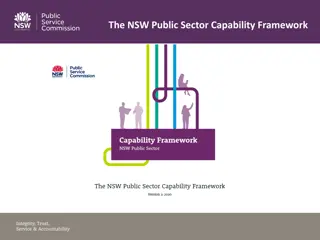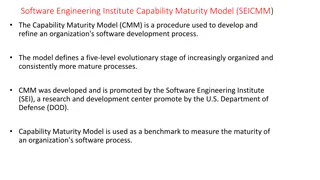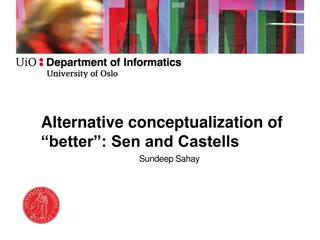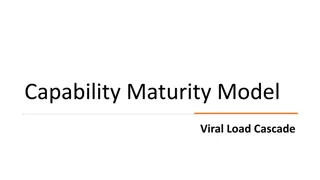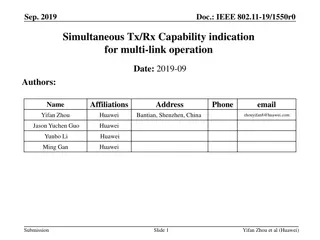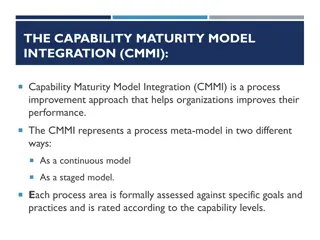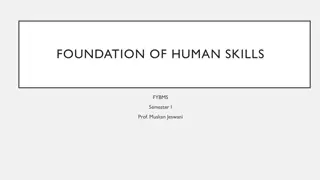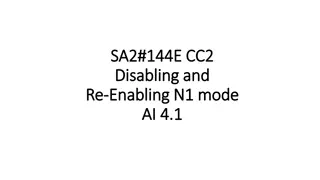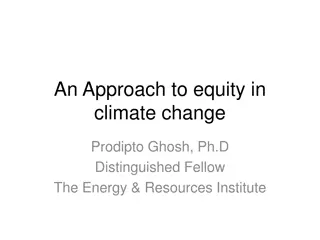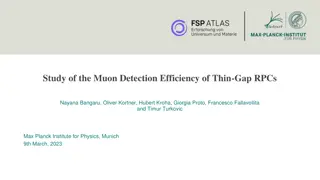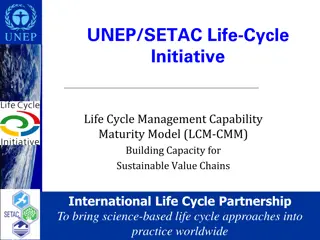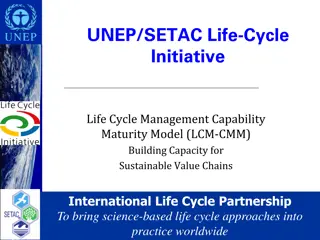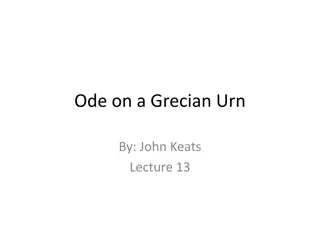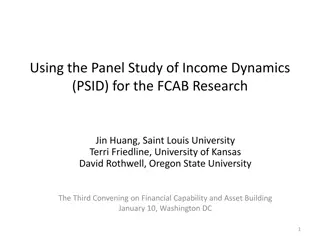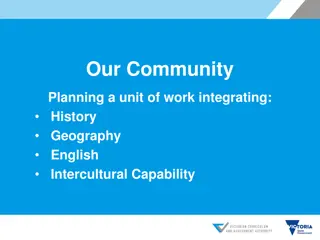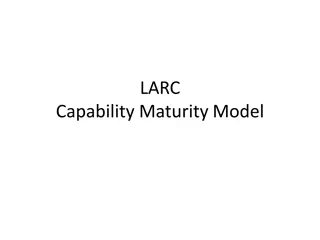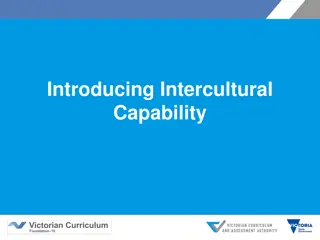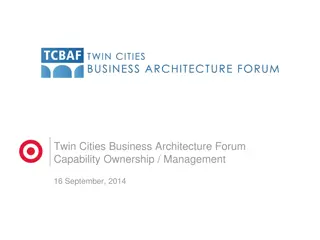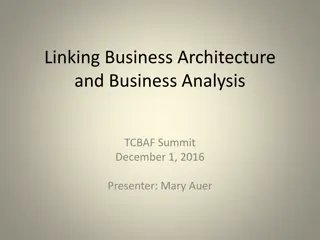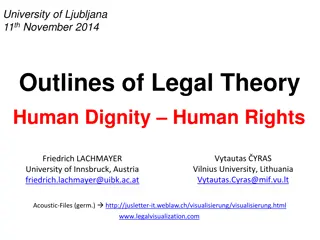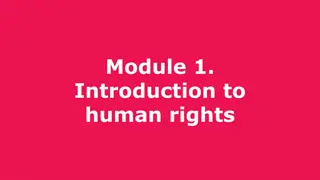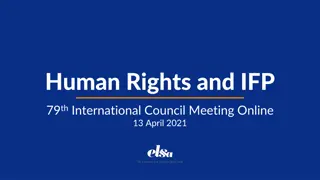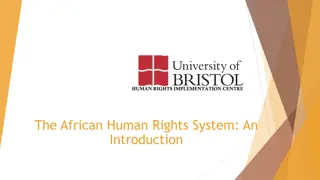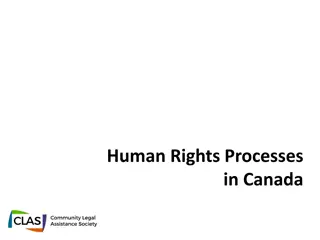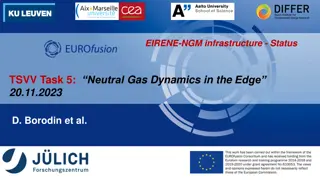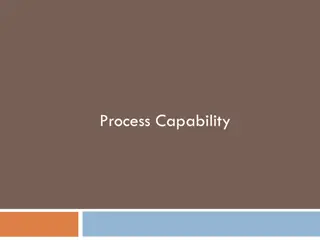NASA Navigation Sensor Technology Assessment Capability
The assessment of navigation sensor technologies for data-driven systems analysis by NASA in October 2023. Discover the motivation, method, survey, simulation model, and selected results of this capability.
0 views • 16 slides
Developing Robotic Process Automation (RPA) Capability - NLIT Summit 2023 in Milwaukee, WI
This article discusses the initiative of developing Robotic Process Automation (RPA) capability in the national interest at the NLIT Summit 2023 in Milwaukee, WI. The focus is on maximizing efficiency, agility, and effectiveness by implementing RPA to automate digital tasks, reduce manual labor, and
2 views • 20 slides
Background to Capability Maturity Model Integration (CMMI)
The Capability Maturity Model Integration (CMMI) is a framework that helps organizations improve their processes and capabilities in developing and delivering high-quality products and services. The background to CMMI involves its evolution from earlier process improvement models and its widespread
0 views • 3 slides
Radiological Emergency Preparedness Program Assessment Guidance
This module covers the assessment policies and guidance for radiological emergency preparedness programs. It includes key concepts such as metrics for program evaluation, FEMA's assurance determination process, specific demonstration requirements, capability targets, and critical tasks. Participants
4 views • 22 slides
JAM Auto-Termination Capability in GPC Appointments
The JAM Auto-Termination capability in GPC appointments carries out routine, system-driven termination of appointments that are abandoned or associated with individuals in Archived status. This helps improve system-access internal control compliance, enhance security, and reduce fraud risk. Steps ca
0 views • 4 slides
Work Capability Assessment (WCA) Criteria Reforms May 2024
The Work Capability Assessment (WCA) determines if individuals claiming ESA and/or UC have limited capability for work (LCW) or work-related activity. Reforms aim to better support disabled individuals to engage with work. Consultation responses highlighted the need for changes in assessing disabili
0 views • 6 slides
Understanding Human Rights in Queensland Government Work
The Human Rights Act of 2019 in Queensland outlines protected rights such as equality, freedom of expression, and fair trial. All public service employees must adhere to these rights, ensuring decisions and actions respect human rights. This act applies to everyone in the Queensland Government, with
2 views • 13 slides
Understanding the Basic Concept of Human Rights in Modern Jurisprudence
Human rights are natural and inalienable, essential for human life, based on universal principles. The concept of human rights is both simple and complex, requiring societal development and political will for implementation. Rooted in natural law theory, human rights have evolved from natural law to
1 views • 24 slides
NSW Public Sector Capability Framework Overview
Describes core knowledge, skills, and abilities required for all NSW public sector employees across different levels and occupational groups. The framework includes five progressive capability levels and provides a shared language for effective work performance. It integrates ethical values, non-spe
3 views • 10 slides
Understanding Media Ecology: Impact of Communication Technology
Media ecology is a theoretical concept analyzing the influence of media and communication technology on human culture. Neil Postman, a prominent figure in the field, delves into how communication media affect human perception, understanding, and values. This study views media as environments shaping
5 views • 23 slides
Understanding SEICMM - Software Engineering Institute Capability Maturity Model
The SEICMM, also known as the Capability Maturity Model (CMM), is a framework developed by the Software Engineering Institute (SEI) to enhance an organization's software development process. It consists of five maturity levels to assess and improve processes, from initial ad hoc activities to optimi
0 views • 6 slides
Rethinking Development: Perspectives on Human Capability and Well-being
Explore alternative conceptualizations of development beyond economic growth, focusing on human capability and freedom. Learn about Amartya Sen's capability approach and Manuel Castells' perspective on inclusion-exclusion in the Network Society. Discover the Human Development Index, Martha Nussbaum'
0 views • 24 slides
Personal IoT Network (PIN) Terminology Discussion for 3GPP TSG-SA WG1 Meeting
In this discussion, the concept of Personal IoT Network (PIN) and its elements are explored, including the roles of PIN Elements, Configuration PIN Capability, and Gateway Capability. The necessity of gateways to the 3GPP network, device examples, and the distinction of licensed spectrum are also ad
2 views • 10 slides
Capability Maturity Model Cascade and Viral Load Testing Stages
This content discusses the Capability Maturity Model stages, focusing on process improvement and the stages of viral load testing demand creation. It outlines the evolution from initial to optimized stages and the development towards standardized processes in organizations. Additionally, it touches
3 views • 8 slides
IEEE 802.11-19/1550r0: Simultaneous Tx/Rx Capability Indication for Multi-Link Operation
This document discusses the simultaneous Tx/Rx capability indication for multi-link operation in IEEE 802.11-19/1550r0. It covers scenarios where link selection depends on link capabilities, actions needed based on Tx/Rx capabilities, and methods to indicate simultaneous operation. The importance of
4 views • 10 slides
Understanding the Capability Maturity Model Integration (CMMI) for Process Improvement
Capability Maturity Model Integration (CMMI) is a framework that aids organizations in enhancing performance by assessing process maturity levels. It offers continuous and staged models for process improvement, with each level representing specific goals and practices. By following CMMI, organizatio
0 views • 14 slides
Understanding Human Nature and Individual Differences in Foundation of Human Skills
Explore the foundational concepts of human behavior, individual differences, and organizational culture in the study of human skills. Delve into topics such as human nature, personality, attitudes, intelligence, and learning in Prof. Muskan Jeswani's course. Understand the significance of inter- and
0 views • 11 slides
Interworking Considerations for N1 Mode Capability in 5G Networks
The article discusses the implications of disabling and re-enabling N1 mode capability in UE operations when transitioning between 5G and 4G networks. It explores scenarios where session continuity may be affected and proposes solutions endorsed by industry stakeholders. Key points include the alloc
0 views • 5 slides
Approach to Equity in Climate Change by Prodipto Ghosh, Ph.D.
Prodipto Ghosh's presentation delves into the terrain of equity in climate change, emphasizing obligations of parties in mitigation, adaptation, and resource transfer. The proposed equity norms highlight cooperation, capability-based resource provisions, and ensuring low-capability individuals stay
0 views • 20 slides
Study of Muon Detection Efficiency in Thin-Gap RPCs
Conducted at the Max Planck Institute for Physics in Munich, this study focuses on the detection efficiency of thin-gap Resistive Plate Chambers. The research explores the construction, working principles, and experimental setup of RPCs, emphasizing the need for sensitive frontend electronics for hi
0 views • 14 slides
Sustainable Value Chains and Life Cycle Management Capability
The UNEP/SETAC Life-Cycle Initiative focuses on building capacity for sustainable value chains through the Life Cycle Management Capability Maturity Model (LCM-CMM). It emphasizes implementing science-based life cycle approaches globally by transitioning from events to management systems, conducting
1 views • 12 slides
Evolution of Human Rights: From Ancient Times to Modern Era
Throughout history, ideas of rights and liberty have evolved, leading to the recognition of universal human rights in the modern sense. The concept of human rights can be traced back to significant historical events such as the English Bill of Rights, the Virginia Declaration of 1776, and the French
0 views • 7 slides
Life Cycle Management for Sustainable Value Chains: Building Capacity and Promoting Innovation
This content delves into the Life Cycle Management Capability Maturity Model (LCM-CMM) aimed at enhancing sustainable value chains globally. It emphasizes the importance of bringing science-based life cycle approaches into practical implementation to address global issues, international standards, c
1 views • 11 slides
Exploring John Keats's Negative Capability Theory in "Ode on a Grecian Urn
John Keats, known for his melancholic temperament, delved into the concept of Negative Capability in his poetry, particularly evident in "Ode on a Grecian Urn." This theory emphasizes the poet's ability to transcend rationality and immerse in intense emotions without the need for analysis or judgmen
0 views • 29 slides
The Link Between Democracy and Human Rights
The core of democracy lies in promoting equal human worth and self-determination. There is a strong connection between human rights, democracy, good governance, and development. Democracy allows people to participate in decision-making, ensuring their views are heard. It upholds freedom, equality, f
0 views • 15 slides
Exploring Asset Accumulation and Financial Capability with PSID Data
Explore the Panel Study of Income Dynamics (PSID) data for research on financial capability and asset building. PSID is a longitudinal survey tracking households since 1968, covering various topics like wealth, savings, pensions, and more. The data allows for studying intergenerational dynamics, wea
0 views • 5 slides
Integrating History, Geography, English & Intercultural Capability in Community Planning
Exploring how to plan a unit of work integrating History, Geography, English, and Intercultural Capability based on the Victorian Curriculum. The unit, "Our Community," spans five weeks and focuses on continuity and change in the local community, significant places, people, and events, and interacti
0 views • 15 slides
The Significance of Human Rights in the Modern World
Human rights are fundamental rights that belong to all individuals, are inalienable, indivisible, interconnected, and should be respected without prejudice. The Universal Declaration of Human Rights, adopted in 1948 after WWII by the United Nations, is a crucial milestone document emphasizing human
0 views • 5 slides
Understanding the LARC Capability Maturity Model for Organizational Improvement
The LARC Capability Maturity Model (CMM) focuses on enhancing the viral load cascade, aiming to achieve better patient outcomes and improve institutional capabilities for viral load scale-up. Developed by Carnegie-Mellon University Software Engineering Institute in 1987, the CMM provides a structure
0 views • 14 slides
Enhancing Transparency in Human Rights Performance Measurement
This information focuses on initiatives like the Human Rights Measurement Initiative (HRMI) that aim to provide new data for researching and advocating human rights issues globally. The HRMI project, founded in 2015, collaborates with various stakeholders and is funded by philanthropic grants. It em
0 views • 19 slides
Enhancing Intercultural Capability in Victorian Curriculum
Victorian Curriculum F-10, released in 2015, emphasizes intercultural capability to develop students' awareness, respect, and skills in cultural diversity. It aims to foster understanding of different cultures, challenge stereotypes, and promote acceptance for a cohesive community. The curriculum st
0 views • 5 slides
Business Capability Ownership Roles and Responsibilities at Target
Explore the journey of developing business capabilities at Target, focusing on ownership roles such as Business Capability Owner, Leader/Manager, Steward, and Stakeholder. Learn how clarity, participation, and executive involvement are essential for successful capability framework creation and utili
0 views • 7 slides
The Connection Between Business Architecture and Business Analysis
Exploring the link between business architecture and business analysis, this presentation delves into the challenges faced by business architects in keeping enablers up to date, establishing a common language, identifying stakeholders, and ensuring traceability. The objective is to facilitate inform
0 views • 17 slides
Outlines of Legal Theory Human Dignity – Human Rights
Explore the significance of human dignity and human rights within legal theory, reflecting on their cultural, moral, and legal implications. Delve into the essence of human rights as an essential cultural achievement, contrasting the protection and denial of human images within different legal conte
0 views • 10 slides
Understanding Human Rights: Module 1 Overview
This module serves as an introduction to human rights principles, instruments, and monitoring mechanisms. It covers the definition of human rights, the Universal Declaration on Human Rights, key principles, and state obligations. Human rights are universal legal guarantees that protect individuals a
0 views • 21 slides
International Focus Programme: Human Rights and Technology Advocacy
The International Focus Programme (IFP) is actively engaging in advocating human rights and technology through various initiatives and campaigns. This includes organizing online meetings, webinars, surveys, and events to raise awareness about freedom of expression online, artificial intelligence, an
0 views • 8 slides
Overview of the African Human Rights System
The African Human Rights System encompasses various key elements such as the Organisation of African Unity, African Charter on Human and Peoples' Rights, African Court on Human and Peoples' Rights, African Union, and additional human rights-related treaties and protocols. This system aims to protect
0 views • 19 slides
Human Rights Processes in Canada: Legislation and Protections Explained
Understand the human rights processes in Canada, including the two general sources of human rights, human rights legislation, federal vs. provincial/territorial laws, and the specifics of the BC Human Rights Code. Learn about direct and indirect discrimination, duty to accommodate, and the areas pro
0 views • 12 slides
Development of EIRENE-NGM for Neutral Gas Dynamics in Fusion Reactors
EIRENE-NGM project focuses on enhancing the neutral gas dynamics model for fusion reactor simulations, including efficient HPC utilization, physics basis refinement, database improvement, interface development, and predictive capability validation. Collaborators from various institutes aim to create
0 views • 17 slides
Understanding Process Capability in Quality Management
Process capability is a crucial concept in quality management that evaluates the ability of a process to meet design specifications. It focuses on the relationship between process variation and desired standards, ensuring that products consistently match set criteria. Learn about Cp, Cpk, and other
0 views • 11 slides

